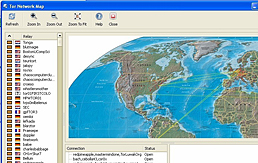Protecting Your Privacy Online, Anonymously
While the Internet is not anonymous, with a little help you can make yourself less obvious and hidden from public view.

Protecting Your Privacy Online, Anonymously
Protecting Your Privacy Online, Anonymously
Sometimes you want people to know who you are, while other times you do not. By default on the Internet, with each and every connection you make you broadcast your location with your public IP address—unless you take steps to protect your identity.
That IP address can be used to track you and your activities ; it can also be used to locate where you are geographically. The Internet is not anonymous.
There are, however, a number of different solutions with which you can hide your real IP address and, in effect, have an “anonymous” Web experience.
Fundamentally, the mechanism by which the anonymous Web experience is achieved is by way of some form of proxy. That is either a proxy client that is installed locally on your own network or PC or one that is available as a browser-based service online. Traffic from your PC is redirected through the proxy making it look to the outside world as if the proxy (which has a different IP address) is where the traffic originated from.
In this review, we look at some of the different options, including Anonymyizer, NetConceal and Vidalia (Tor), as well as a number of online services such as Anonymouse and Megaproxy. We’ll evaluate what works well and what does not to help make you anonymous online.
Get instant access to breaking news, the hottest reviews, great deals and helpful tips.
Current page: How to Be Anonymous Online - Protecting Your Privacy - Tom’s Guide
Next Page Anonymizer Review - Anonymous Web Surfing Software - Tom’s Guide
Tom's Guide upgrades your life by helping you decide what products to buy, finding the best deals and showing you how to get the most out of them and solving problems as they arise. Tom's Guide is here to help you accomplish your goals, find great products without the hassle, get the best deals, discover things others don’t want you to know and save time when problems arise. Visit the About Tom's Guide page for more information and to find out how we test products.
-
I found using a product like SafeSpace much better for protecting my privacy and it prevents malware infection too. Kinda two birds with one stone so to speak.Reply
-
Fbender You forgot to mention email privacy like Mailinator !!! (which I just used to sign up for this tom's acct (but had to use an alternate domain :) - you guys write about privacy but don't believe in allowing it?))Reply -
bberson I think this proxy stuff is over-rated and the concept of privacy is distorted. There are plenty of ways to toss your privacy out the window on the Internet and your IP address is at the very bottom of that list. And if you really need to hide your IP then (a) I can't help but wonder about the legality or propriety of what you're up to, (b) your first inquiry should be whether your anonymizing service is subpoena-proof. Many are not. The Tor network is interesting in this respect, since if nothing else it substantially complicates inquiry efforts.Reply
Let's separate fact from fiction and potential from practice...
Is your IP anonymous? Mostly, unless you have your own assigned address space (I do) or you're doing your surfing from a business or enterprise that has its own assigned address space. Finding out who is behind an ISP's dynamically assigned IP takes a letter from an attorney. Hardly an automated process.
Can your IP address reveal your geographic location? Yes, but only roughly. It will not reveal your address. At best it will reveal your town and in some cases, even that may be somewhat inaccurate depending on how your service is provisioned.
On the other hand if you fake your IP, any web site that uses geolocation services to target advertising, will offer you ads that are irrelevant. I'm on the fence with this. Which is worse? Relevant ads or irrelevant ads? Those of us who are experienced pretty much ignore all ads anyway.
Can your IP address be used to track you? Absolutely not. I can walk out the door right now and although I'll have to stop typing, I can guarantee you that nothing about my IP address will have given away the fact that I went to get a bottle of Coca-Cola from across the street.
Can your IP address be used to track your activities? Yes, to a limited extent, but due to the prevalence of dynamic IP addressing and the number of proxy -based systems (frequently used more for security in large companies than for privacy), generally nobody bothers. Cookies are a more reliable way to associate a person (or at least a computer) with their browsing habits. But for that to happen successfully some cooperation is required among the sites that place those cookies on your computer. Don't even get me started about cookies - another overblown source of panic.
SSL proxy connections. All very well and good for keeping prying eyes out of your local data stream but useless once the data leaves the proxy and finds its way to the web server. So at least it'll keep your ISP and your neighbor's young hacker kid off your bits 'n bytes.
Some of the other options really slay me. Why block info about your OS and your browser version? Seriously! And why strip HTTP Referer header info? A lot of this is used to help improve the web browsing experience for a viewer and in the case of referers, helps protect the site from abuse.
There are some other interesting purposes for web proxies that aren't directly related to privacy, such as circumventing ridiculous limitations on certain web services. It might help with the quality of your search results during your stay in China, or help facilitate access to P2P applications that are blocked from USA IP addresses, or help travelers gain access to USA web services that block or offer reduced functionality to offshore IP addresses.
A final note is that web browsing these days often involves a lot of extra plug-ins, multimedia widgets, peer to peer gadgets and so on. Not all of these blindly play along with proxy settings or proxy stacks. Some will do their own thing and some simply won't work at all. You'll have no idea if one of those pieces are dancing to their own beat until you run packet capturing software - a job not well-suited to those without propellor beanies. Those of us with the beanies know better than to care. -
Man, there are so many things wrong with the comment above..too lazy to list them personally. But he's obviously not up with current times on what you can do with an ip address.Reply
-
scout123 IP Check makes anonymouse.org & Co look really nakedReply
The privacy test IP Check uncovers that web proxy providers like Anonymouse.org can indeed not provide any privacy protection. Any arbitrary website is able to circumvent web proxies and to uncover the user's IP address and browser data, which should be actually protected by the proxy.
The respective security leaks are supposed to be present since up to 10 years in the code of these services. The question arised, whether anybody had seriously checked them for attacks before... You may find a demo of the numerous possible attacks here:
http://anonymouse.org/cgi-bin/anon-www.cgi/http://ip-check.info/?lang=en
In the following, you moreover find a detailed description of the tests:
http://ip-check.info/description.php#WebProxyDeanonymization
You find the main page of the IP Check itself here:
http://ip-check.info?lang=en
The question is: are web proxy providers intentionally deceiving their users regarding the security of their systems? Or do they simply lack the necessary competence in the area of IT security? Is it all about making money, or also about collecting detailed data about the users? In any case, it should be clear that the currently available web proxies are at the best suitable for the circumvention of Internet censorship, but in neither case for anonymous surfing.
It is possible that the IP check wil be blocked by some web proxy providers because of this demonstration. This would not be astonishing, as there is even in theory no protection against some of the used leaks. Whoever wants to make himself convinced should therefore do it now, before censorship will take place. However, you might realize any censorship of the Ip check as a confession that the web proxy providers are helpless against the attacks that are shown. -
In a very short answer to Mr. I question the legality of what you're doing: stalkers. It's not what I'm doing, it's what I'm trying to avoid being done to me. I can move around, or I can move my IP around. Can someone tell I've stepped out for a Coke? No. Can someone sit on a corner, in the general area of the IP, waiting for the day I come by? Sounds stupid, yes? Ask law enforcement tasked with picking up the pieces when the stalker finds the stalked, even after very elaborate steps have been taken to protect the stalked. Stalkers are obsessed, and tracking an IP is only one of their tools. I choose not to give it to them.Reply
 Club Benefits
Club Benefits





